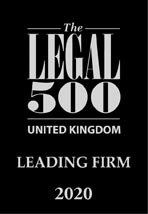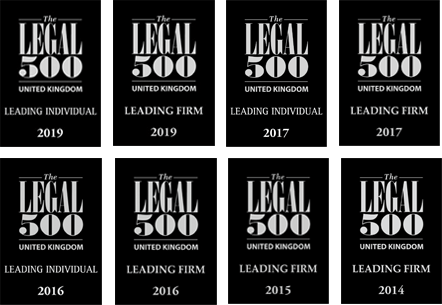T: 01242 228 444 (Cheltenham)
T: 0121 371 0301 (Birmingham)
CASE STUDIES
Case Studies
The following are a short synopsis of situations where Simon Burn Solicitors have helped a variety of clients who have been facing Directors Disqualification proceedings.
The Questionnaire
Mr D
Mr D was a chartered accountant who had been involved in the management of a client company. It was arguable whether or not Mr D had in fact been a de facto director of the company but he was investigated by the Insolvency Service in connection with his involvement in the affairs of the company.
As a chartered accountant Mr D would have been prohibited from acting as a chartered accountant if Directors Disqualification proceedings had resulted in an Order being made against him.
We assisted Mr D in answering the questions of him by the Insolvency Service and as a result no further action was taken against Mr D.
Mr F
Mr F was a successful entrepreneur running a manufacturing company. The company went into Administration. A negative report was sent to the Insolvency Service by the Administrator (with whom Mr F had fallen out in connection with fees).
Detailed questions were put to Mr F in relation to the use of a factoring facility. We assisted Mr F in responding cooperatively to all of the questions raised by the Insolvency Service.
No further action was taken against Mr F following receipt of his questionnaire.
The Section 16 letter / possible proceedings
Mr G
An allegation had been made that Mr G had caused his company to make a loan to a connected company 90 minutes before his company went into Administration and that the transaction was therefore to the detriment of creditors in the Administration.
We submitted detailed Affidavit evidence on Mr G’s behalf and the matter was ultimately listed for a two day Trial. A Barrister of considerable experience in this field was instructed and mounted a vigorous defence to the allegations.
The Court concluded that when the facts were properly analysed this was not a case where Mr G had fallen below the standards of probity and competence for a person to be a company director. The proceedings were dismissed and Mr G recovered his costs in full.
Mr P
Mr P was disqualified as a director in the mid-2000s. We assisted him in the mid-2000s to obtain permission to act for one of the companies in which Mr P was a shareholder and wished to act as a director.
Mr P was also a shareholder in another company which subsequently became insolvent. Mr P was threatened with Directors Disqualification proceedings alleging that he had breached the terms of his Undertaking and had acted as a director.
Acting in breach of a Directors Disqualification Undertaking is an extremely serious allegation and can also have criminal consequences. We assisted Mr P in putting in a robust defence to the proceedings by serving a detailed Affidavit explaining why the evidence of the claim against him was flawed.
Shortly after serving Mr P’s Affidavit the Insolvency Service discontinued any further action against him.
Mr W
We were instructed by Mr W who was an International businessman dealing particularly in the Middle East and Africa. Mr W routinely dealt with Heads of State and Government. Mr W was threatened with Disqualification proceedings in relation to a business that he was involved with in the United Kingdom.
We made representations to the Insolvency Service that Mr W should not be disqualified. However, the Insolvency Service pressed ahead and issued proceedings against Mr W notwithstanding these representations.
Avoiding Disqualification was particularly important to Mr W in view of his International business career and we were instructed to robustly defend the proceedings on Mr W’s behalf.
We prepared a detailed Affidavit on Mr W’s behalf and carried out a forensic examination of the company’s accounting records. These records showed that the Insolvency Service had overlooked a number of significant and critical points. Mr W’s Affidavit was served and shortly after the claim was discontinued and Mr W recovered the majority of the costs that he had incurred.
Permission to act
Mr M
Mr M had been subject to a criminal investigation and had pleaded guilty in the Crown Court for three offences relating to false accounting. Mr M was imprisoned for four years but on release returned to custody as a consequence of a failure to meet all the payments due under a Confiscation Order and served a further eighteen months incarceration. The criminal Courts had also ordered disqualification for a period of seven years under Section 2 of the Company Directors Disqualification Act.
On his release from prison, we issued a permission application for Mr M to be involved in the management of two companies. The application was opposed by the Secretary of State on “policy” grounds on the basis that the disqualification arose from criminal proceedings.
The matter was ultimately heard with Mr M being represented by our experienced Counsel and we were successful as the “policy” arguments were dismissed.
Mr L
Mr L was an international businessman who was involved in a variety of businesses in the United Kingdom and worldwide. Unfortunately one of Mr L’s businesses in the United Kingdom became insolvent. Before our involvement Mr L offered a Directors Disqualification Undertaking. Mr L did not want to get involved in defending proceedings in order to avoid the stress and publicity of doing so.
Subsequently however Mr L was asked to assist a UK based engineering business and we were asked to assess whether or not his proposed role in the new business would contravene his Disqualification Undertaking. We quickly identified that the Disqualification Undertaking would be contravened in view of the fact that Mr L needed to deal at board level with a number of global manufacturing companies.
An application for permission to act was prepared and submitted to Court and Mr L was granted permission to act as a director at the first Hearing.
Mr A
Mr A was a certified accountant with many years’ experience and a successful practice. Unfortunately Mr A became involved in one of his client’s companies which subsequently went into a Creditors Voluntary Liquidation. Mr A’s client had in fact allowed the company to incur significant debts to HMRC and Mr A was faced with Directors Disqualification proceedings on the basis that the company had been traded to the detriment of HMRC.
Although Mr A had lines of defence that we identified he did not want to expose himself to the stress and cost of defending the proceedings. An Undertaking was quickly agreed with the Insolvency Service and a successful application was made for permission to act and Mr A was able to continue with his accountancy practice.
This is just a short précis of a number of cases where we have assisted clients achieving a positive outcome to those threatened with Directors Disqualification proceedings.
FREE ASSESSMENT
No obligation advice
Please send me: Directors Defence
"The Simon Burn Solicitor Guide"
FREE ASSESSMENT No obligation advice
T: 01242 228 444 (Cheltenham)
T: 0121 371 0301
(Birmingham)
This firm is regulated by the Solicitors Regulation Authority under SRA No. 516917
© Simon Burn 2017.
Website by
Cotswold Web
T: 01242 228 444 (Cheltenham) |
T: 0121 371 0301 (Birmingham)
This firm is regulated by the Solicitors Regulation Authority under SRA No. 516917
© Simon Burn 2017.
Web Design
by Cotswold Web

